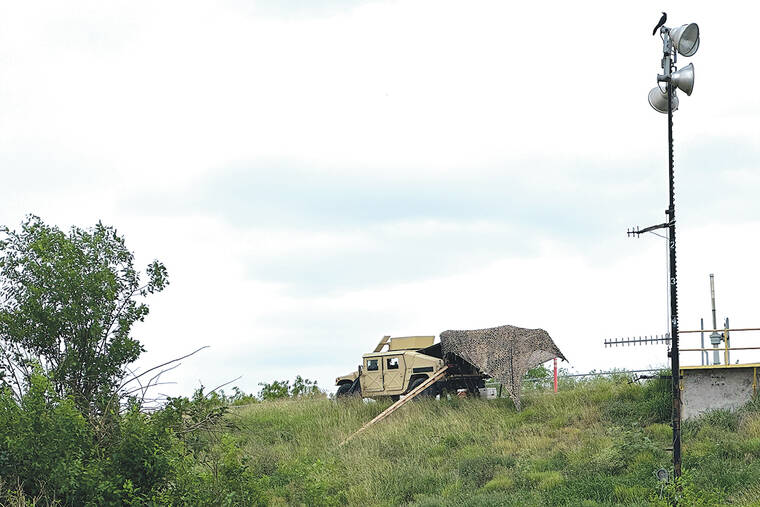Anticipation and anger on Texas border after Supreme Court lets strict immigration law take effect
McALLEN, Texas — A Supreme Court decision that lets Texas arrest and deport migrants — at least for now — on charges of illegally entering the country could have a dramatic impact on the U.S.-Mexico border but its immediate effect was muted.
Sheriffs and police chiefs who will put the law into effect were largely circumspect about when, where and how migrants may be arrested. Before a divided court on Tuesday let the state law take effect while a legal challenge plays out, some sheriffs were ready to relish an unprecedented state expansion into border enforcement, while others were reluctant.
Texas was silent in the hours after the ruling on whether and when state troopers or Texas National Guard soldiers — who have the most interaction with migrants — would begin enforcement.
Mexico’s Foreign Affairs Secretary said in a sharply worded statement that it would refuse to take anyone back who is ordered to leave the country under the state law and that it “categorically rejects” any state or local government enforcement of immigration laws.
“Mexico reiterates the legitimate right to protect the rights of its nationals in the United States and to determine its own policies regarding entry into its territory,” the government said.
Kinney County Sheriff Brad Coe, who has largely embraced Texas Gov. Greg Abbott’s multibillion-dollar border enforcement effort, said he was “prepared to proceed with prosecutions” but officers would need “probable cause” to make arrests. His county covers a stretch of border near Del Rio that was recently the busiest corridor for illegal crossings but quieted considerably.
“It is unlikely that observers will see an overnight change,” Coe said.
El Paso County Judge Ricardo Samaniego, the top county executive, said immigration enforcement should remain a federal, not state, responsibility, echoing the Biden administration’s view. He said heightened law enforcement presence in the city of El Paso during a previous migrant surge brought high-speed chases and traffic stops based on assumptions that passengers were in the counry illegally.
“We had accidents, we had injuries, we got a little glimpse of what would happen if the state begins to control what happens in respect to immigration,” Samaniego said.
The impact extends far beyond the Texas border. Republican legislators wrote the law so that it applies in all of the state’s 254 counties, although Steve McCraw, the director of the Texas Department of Public Safety, has said he expects it will mostly be enforced near the border.
Other GOP-states far from the border are also already looking to follow Texas’ path. In Iowa, the state House on Tuesday gave final approval to a bill that would also give its state law enforcement the power to arrest people who are in the U.S. illegally and have previously been denied entry into the country.
It now goes to Republican Gov. Kim Reynolds.
If signed, it would take effect in July.
“The federal government has abdicated its responsibilities and states can and must act,” said Rep. Steven Holt, a Republican from Denison.
Skylor Hearn, executive director of the Sheriffs’ Association of Texas, said sheriffs’ offices have been training since last year.
“If a county chooses to take it on themselves, they are choosing for their taxpayers to take it on themselves as well,” Hearn said. “As long as the federal government is willing to do its part that it is supposed to be doing, it is ideal for them to take possession and custody of these people.”
There was no immediate rush on the border and no word of arrests, but news of the ruling spread rapidly and triggered alarm among migrant advocates.
“Terrible, late-breaking news, my friends!” Carlos Eduardo Espina said on his TikTok account with more than 8 million followers, many of them migrants in transit. He said the law would sow confusion and promised “know-your-rights” instructions on how to respond to police questioning.
Daniel Morales, an associate professor of law at the University of Houston Law Center, said the Texas law “will be a mess, very clearly, to enforce.”
“It’s very clear that Greg Abbott wants to enforce the law so he can get lots of photo ops and opportunities, but it’s gonna take a lot of state resources to implement. And I don’t know, in fact, how much appetite and capacity for that the state government actually has,” Morales said. Texas will find enforcement is “difficult and taxing,” he said. Arrests for illegal crossings fell by half in January from a record-high of 250,000 in December, with sharp declines in Texas.
Arrests in the Border Patrol’s Del Rio sector, the focus of Abbott’s enforcement, fell 76% from December. Rio Grande Valley, the busiest corridor for illegal crossings for much of the last decade, recorded its fewest arrests since June 2020.
Tucson, Arizona, has been the busiest corridor in recent months, followed by San Diego in January, but reasons for sudden shifts are often complicated and are dictated by smuggling organizations.
When President Joe Biden visited the Rio Grande Valley for his second trip to the border as president last month, administration officials credited Mexico for heightened enforcement on that part of the border for the drop in arrests. They said conditions were more challenging for Mexican law enforcement in Sonora, the state that lies south of Arizona.


